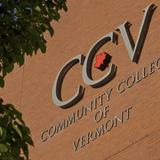- Champlain College is a private college in Burlington, Vermont, United States. Founded in 1878, Champlain offers on-campus undergraduate and online undergraduate courses through Champlain College Online, along with online certificate and degree programs and master's degree programs, in over 80 subject areas.
School Highlights
Champlain College serves 4,781 students (54% of students are full-time).
The college's student-teacher ratio of 10:1 is lower than the state community college average of 16:1.
Minority enrollment is 35% of the student body (majority Hispanic and Black), which is more than the state average of 22%.
Quick Facts (2026)
- Enrollment: 4,781 students
- Private-state tuition: $33,000
- Acceptance Rate: 62%
- Student-teacher ratio: 10:1
- Minority enrollment: 35%
- Source: Integrated Postsecondary Education Data System (IPEDS)
School Overview
The teacher population of 478 teachers has stayed relatively flat over five years.
Champlain College
(VT) Community College Avg.
Carnegie Classification
Master's Colleges & Universities: Larger Programs
Baccalaureate/Associate's Colleges: Mixed Baccalaureate/Associate's
Institution Level
Four or more years
Four or more years
Institution Control
Private not-for-profit
Private not-for-profit
Total Faculty
478 staff
270 staff
School Calendar
Student Body
The student population of Champlain College has grown by 15% over five years.
The student-teacher ratio of 10:1 has decreased from 18:1 over five years.
The Champlain College diversity score of 0.55 is more than the state average of 0.38. The school's diversity has stayed relatively flat over five years.
Total Enrollment
4,781 students
4,144 students
Student-Teacher Ratio
10:1
16:1
# Full-Time Students
2,561 students
1,924 students
# Part-Time Students
2,220 students
2,220 students
# Enrollment Undergraduate
393 students
393 students
# Full-Time Undergraduate Students
2,528 students
2,528 students
# Full-Time Graduate Students
33 students
33 students
# Part-Time Undergraduate Students
1,410 students
512 students
# Part-Time Graduate Students
810 students
129 students
Total Dormitory Capacity
1,460 students
510 students
% American Indian/Alaskan
n/a
n/a
% Asian
4%
2%
% Hispanic
10%
5%
% Black
8%
4%
% White
65%
78%
% Hawaiian
n/a
n/a
% Two or more races
4%
4%
% Non Resident races
n/a
1%
% Unknown races
8%
6%
Diversity Score
0.55
0.38
College Completion Rate (Students who graduate in less than 4 years)
n/a
24%
College Completion Rate (Students who graduate in 4 years or more than 4 years)
64%
34%
Average Graduate Earnings (10 Years)
$44,500
$30,700
Tuition and Acceptance Rate
The private state tuition of $33,000 is less than the state average of $38,857. The private state tuition has declined by 22% over four years.
Private State Tuition Fees
$33,000
$38,857
% Students Receiving Some Financial Aid
99%
99%
Median Debt for Graduates
$26,000
$19,042
Median Debt for Dropouts
$9,815
$5,500
Acceptance Rate
62%
62%
SAT Reading
620
620
SAT Math
595
595
SAT Writing
545
545
ACT Composite
27
27
ACT English
27
27
ACT Math
25
25
ACT Writing (Year 2012)
7
7
Source: 2024 (or latest year available) Integrated Postsecondary Education Data System (IPEDS)
School Notes
- Sample of notable school alumni/alumnae:
- -
Frequently Asked Questions
How much does Champlain College cost?
Champlain College's private state tuition is approximately $33,000.
What is the acceptance rate of Champlain College?
The acceptance rate of Champlain College is 62%, which is equal to the state average of 62%.
Who are famous alumni from Champlain College?
Champlain College famous alumni include: .
In what neighborhood is Champlain College located?
Champlain College is located in the South End neighborhood of Burlington, VT.
Recent Articles

5 Key Community College Trends Parents Should Know in 2026
Explore major 2026 community college trends including enrollment changes, costs, career programs, and affordability for parents planning college decisions.

Average Community College Tuition Cost 2026 Update
Explore updated 2026 community college tuition averages, cost trends, planning tips, admissions timing advice, and financial strategies for families and students.

Preparing for Placement Tests in 2026: Student Guide
Preparing for Placement Tests in 2026, what students, parents, and educators need to know about formats, prep strategies, and placement changes.











